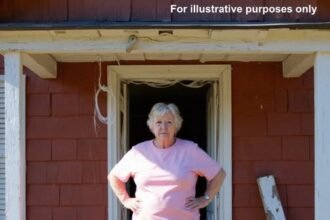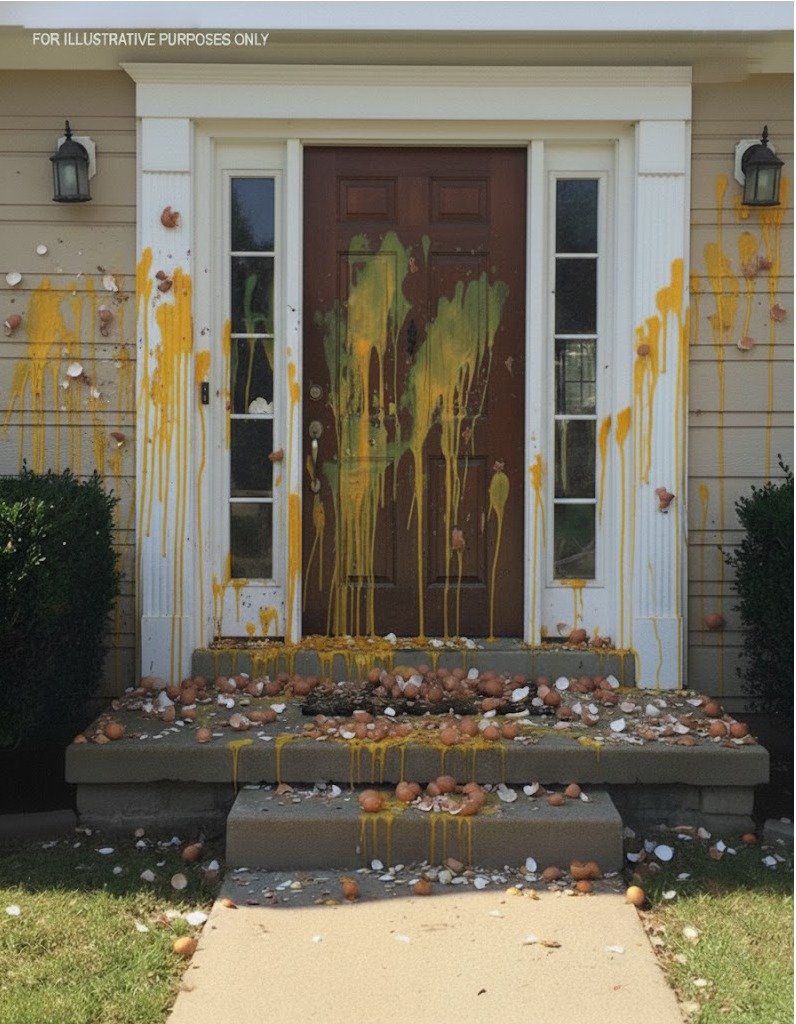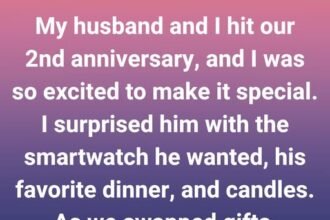Could he really? Over piano music? I wanted another explanation—teenagers, a prank gone wrong.
But I knew. I stood there another minute, breathing hard, pushing down the anger. Then I set my coffee on the railing and walked across the grass to his door.
My heart hammered. I knocked three times. I waited on his faded welcome mat, hands shaking.
Finally the door flew open. Duval stood in wrinkled sweats and an old T-shirt, clutching a mug. Hair wild, eyes tired, face blank.
“Duval,” I said. “Do you know anything about my door?”
He sipped his coffee, didn’t blink, just stared like I was selling something useless. Then the corner of his mouth twitched.
“Yeah. I did it.”
I thought I’d heard wrong. “You threw eggs at my house?”
He shrugged, like it was nothing.
“Yep. You play that piano every damn day and I’m done. Maybe now you’ll stop.”
My chest tightened, throat went dry.
“You could have talked to me!” I said. “Knocked and asked me to play quieter or at another time. I would have listened, Duval.
We could have worked it out.”
He leaned on the doorframe, arms crossed, smirk still there. “Lady, I don’t beg people to act right. This was faster.
Call it a wake-up call. You’ll remember.”
He stepped back and slammed the door in my face. I stood stunned that a grown man could do this and feel zero shame.
I walked home, stepping around shells and trash. The stink made my stomach lurch again. I grabbed a bucket, filled it with soapy water, knelt on the steps, and started scrubbing.
Yellow streaks smeared the paint. Shell bits clung like glue. Tears rolled down my cheeks.
Not for the ugly door, but because someone could be this cruel over a harmless song I played to remember my husband. I kept scrubbing, wiping my eyes with the back of my wrist, trying to pull myself together. Then a car crunched into the driveway.
I looked up and saw my daughter Lux climbing out, smiling, groceries in hand. She’d said she was visiting today; in the chaos I’d forgotten. Her smile vanished when she saw me.
She dropped the bags and ran over. “Mom? What happened?”
I tried to stand, brushed hair from my face, forced a smile.
“Hey, honey. Just cleaning a little mess.”
She stared at the door, the bucket, me. Confusion turned to fury in seconds.
“That’s no little mess. Someone egged our house!”
I sighed. “It’s okay, Lux.
Really. It’s over.”
She crouched beside me, eyes searching mine. “Mom.
Who did this?”
I hesitated. I hated drama. But she gave me that look—the one that says she knows I’m hiding something.
So I told her everything: Duval, the piano, his confession, the slammed door. She stared, speechless. “He did WHAT?”
Before I could stop her she was up, phone in hand, marching down the street.
“Lux, wait—”
“You sit, Mom. I’ve got this.”
And she was gone. From the kitchen window I watched her knock on every door.
Mrs. Midge first, then Mr. Lewis across the street, then the Thompsons.
Her hands flew as she explained. People stepped onto porches, shook heads, glared at Duval’s house. Minutes later Lux burst back in, breathless but fired up.
“Mom, they’re all mad. And guess what? Nobody is bothered by your music.
They love it. Mrs. Midge says it reminds her of her own mom.
Mr. Lewis says his kids fall asleep easier when you play. Mr.
Brooks opens his window every afternoon just to listen.”
My heart lifted. All morning I’d felt ashamed; now I felt seen. Lux folded her arms.
“You’re not the problem. He is.”
Outside, voices gathered. Neighbors lined the sidewalk, waving, shouting encouragement.
“We love your music, Velma!”
“Don’t let that grouch get you down!”
Mr. Lewis grinned. “You know what?
Time we showed Duval what loud really means.”
Everyone laughed, then nodded, serious. Mrs. Midge still had her college guitar.
Her husband offered his harmonica. Little Cosmo yelled, “I have drums!”
Lux turned to me, eyes sparkling. “Mom, clear the porch.
The block band is about to play its first gig.”
I laughed through leftover tears. After a bitter morning, everything flipped. Shame became warmth.
Cruelty became community. And just like that, my quiet street buzzed with life again. A few days after our surprise concert, the neighborhood settled back—kids on bikes, dogs barking, sprinklers hissing.
But one thing stayed the same: Duval had vanished behind closed curtains. Then one afternoon while I watered petunias, footsteps crunched on the gravel. I turned.
There he was. Duval stood by the fence, hands deep in pockets, looking small. No coffee mug this time, just a little brown envelope.
“Mrs. Turner,” he said softly. I waited.
“I came to say sorry.”
I stayed quiet. He shifted, cheeks red. “That was childish and mean.
I don’t know what got into me.” He sighed. “If I ruined your door or porch, I’ll pay to fix it, or do the work myself.”
I gave a small smile. “Thank you, Duval.
That means a lot. The door’s clean now.”
He nodded at the ground. “Good.
Um, I heard you play the other day. It’s… nice. Peaceful.”
I chuckled.
“Glad you think so. I’ll keep the concerts short.”
That earned a real smile. He waved awkwardly and walked home, shoulders lighter.
Minutes later I sat at Arvid’s piano, sunlight spilling gold across the keys. My fingers found the familiar notes of “Moon River,” and I understood something simple but true. Sometimes the hardest hearts just need one gentle melody to remember how to be human again.





